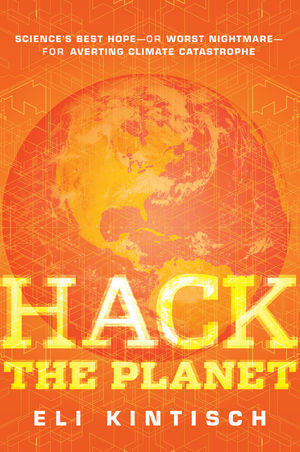Sometimes blog posts have immediate impacts. On Thursday, March 18, I wrote a piece on the Climate Response Fund that reflected concerns raised to me by many leading climate experts: “Exclusive: Chief sponsor of landmark climate manipulation conference maintains close financial ties to controversial geo-engineering company.”
CRF’s Board responded with a statement on Friday, specifically addressing these concerns:
… the Climate Response Fund exists to fund conferences, dialogues and discussions about climate intervention, and to assist in conveying the results of such deliberations to all parties interested in mitigating climate change.
To be absolutely clear, Climate Response Fund will not fund field experiments for any climate intervention technique now or in the future including, but not limited to, ocean fertilization, solar radiation management by stratospheric aerosols, tropospheric aerosols, adding alkalinity to the ocean or any other particular climate mitigation techniques.
That is the unequivocal statement many had been looking for, to eliminate the appearance that the nonprofit helping to shape the norms and guidelines for geo-engineering experiments had a potential financial interest in the outcome.
How important is this statement?
 Eli Kintisch, reporter for Science magazine, has a forthcoming book on geo-engineering,Hack the Planet, which discusses CRF (run by Margaret Leinen) and its relationship to the firm Climos (run by her son, Dan Whaley, with her, formerly, as its chief scientific officer). Climos had been pursuing a doubly dubious scheme to perform ocean iron fertilization experiments and sell carbon offsets for them (see “Rule Three of Offsets: No Geo-engineering“).
Eli Kintisch, reporter for Science magazine, has a forthcoming book on geo-engineering,Hack the Planet, which discusses CRF (run by Margaret Leinen) and its relationship to the firm Climos (run by her son, Dan Whaley, with her, formerly, as its chief scientific officer). Climos had been pursuing a doubly dubious scheme to perform ocean iron fertilization experiments and sell carbon offsets for them (see “Rule Three of Offsets: No Geo-engineering“).
On page 147, Kintisch writes that after Climos decided to abandoned the idea of selling offsets for their geoengineering scheme:
Instead, Leinen founded a nonprofit organization, the Climate Response Fund (CRF), to raise money for geo-engineering, hiring a well-connected fund-raiser in California named Danielle Guttman-Klein to do so. Headquartered in Arlington, Virginia, the organization had an unclear connection to Climos. Leinen said the two were completely separate, and that she had no financial stake in the company. Whaley told me in the spring of 2009 that “appropriate conflict of interest controls were in place” but thatthe organization would financially support any iron fertilization experiments that Climos helped organize. “CRF will fund the researchers directly,” he told me. “Climos will handle the logistics.”
I spoke to Kintisch over the weekend, and he stands by that reporting. So CRF has clearly changed its mission dramatically, which is a good thing.
CRF has also made the decision to sever its relationship with William Kohrs, “who handled CRF’s fiscal administration on a part-time basis for the conference” and who is “also VP Finance and Administration of Climos, Inc.”
Geo-engineering expert David Keith, who was among those who raised concerns about the CRF-Climos connection, cc’d me on an email to Leinen Sunday:
The board statement clarifies the goals of CRF. These goals seem admirable and entirely appropriate for an organization sponsoring a meeting like Asilomar. For my part, they answer the questions central I raised in my correspondence with Joe Romm.
This relieves my concerns about attending the meeting.
Thank you very much for this.
Of course, it still looks “awful” the sole “Strategic Partner” of landmark geo-engineering conference is Australia’s “dirty coal” state of Victoria.
And the few plausible geo-engineering schemes remain very, very dubious, and offer no serious prospect of viability absent very aggressive mitigation (see Caldeira calls the vision of Lomborg’s Climate Consensus “a dystopic world out of a science fiction story”) — and very possibly not even with aggressive mitigation, a point I’ll discuss shortly.
Related Posts:
- Science: “Optimism about a geoengineered ‘easy way out’ should be tempered by examination of currently observed climate changes”
- British coal industry flack pushes geo-engineering “ploy” to give politicians “viable reason to do nothing” about global warming.
